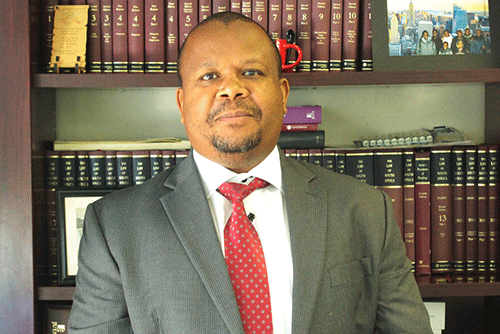A lawyer representing a Cuban doctor accused of raping his colleague at the doctors’ quarters in Windhoek says the Combatting of Rape Act is too vague, wide and confusing.
Advocate Thabang Phatela, who was arguing on behalf of Dr Pedro Luis Viera (57) in a constitutionality challenge, says Section 2(2) of the Act purports to provide the definition of coercive circumstances, which makes provision for the words “but it is not limited to”, which is vague and unclear.
Viera is charged with two counts of rape, in terms of the Combating of Rape Act 8 of 2000, assault by threat, theft and malicious damage to property. He has denied the charges.
“The impact on a person charged under this section, which is a cornerstone of the entire statute, is that it leaves a person charged thereunder unclear and incapable of knowing the full extent of the criminalised behaviour thereunder,” argued Phatela.
He added it is important for an accused person to know exactly the nature of the charges as well as the components of the criminalised behaviour forming part of the charges that they may be facing in terms of that law.
Phatela indicated that it is also important for an accused person to understand exactly the full size, extent and limits of the penal law which forms the subject matter of the charges so that, as an accused person, one does not find themselves facing criminal behaviour to support limitless charges containing limitless conduct which has not been properly set out by the Legislature in the Act.
“The law such as section 2(2) sets out serious charges but still leaves the description of further and more coercive circumstances undefined and subject to the whims of anyone, it renders such a law vague and unclear as to its true import in the definition,” explained Phatela.
Thus, the words “but is not limited to” are unconstitutional, invalid, and of no force in law and effect and should be struck from the Act.
Opposing the application on behalf of the prosecutor general, Marcus Nixon argued Viera misconstrues the meaning and purpose of the Act.
“Our law of procedure contains sufficient safeguards to ensure that, charges are formulated clearly, amendments to the charge do not prejudice the accused, and for irregularities to be addressed by the court seized with the matter or by a court of appeal,” Nixon argued.
He added Viera’s argument does not give consideration to the in-built procedural safeguards contained in the procedural law to ensure a fair trial.
Furthermore, Nixon claimed, Viera has failed to present a serious challenge to the law and the application should be dismissed with costs.
Prosecutor general Martha Imalwa in her replying affidavit said the Act is to combat rape in all its different manifestations, displaying itself as an abuse of power, through sex, to degrade and violate the victim’s dignity.
“In order to effectively combat the scourge of rape in our society, the Legislature deemed it fit to provide for a broad and non-exhaustive list of what constitutes cohesive circumstances,” explained Imalwa.
She added a closed list of cohesive circumstances risks perpetrators evading punishment, thus the court has been given the power to determine, on a case-by-case basis, whether a specific fact and circumstances amount to coercive circumstances within the context of the law.
Viera, who is currently free on N$10 000 bail, is yet to go on trial.
The prosecution is alleging that on 5 December 2018, Viera raped a fellow doctor with whom he was working in Windhoek.
According to the police, the victim informed them that Viera followed her to the doctors’ quarters, where he questioned her about the reasons why she refused to have a relationship with him.
Thereafter, Viera sexually assaulted the victim and instructed her to bath.
The full bench of judges Naomi Shivute, Herman January, and Claudia Claassen will give a ruling on 6 December.
-mamakali@nepc.com.na


